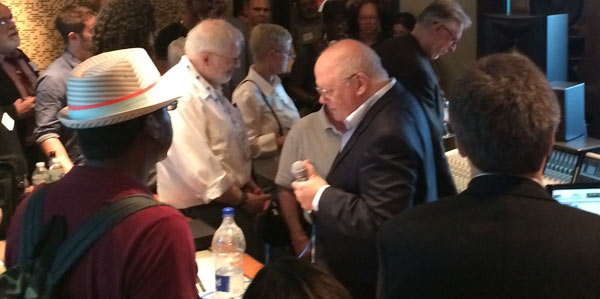Jungle City Studios HiRes Demo Session: Part IV
Maybe I should apologize for the continuing analysis of the events held last week at New York City’s Jungle City Studios by the DEG, CEA, NARAS and major labels but I really do think it’s worthwhile to share what the presenters had to say and demonstrate, which included Kevin Reeves (a mastering engineer), Chuck Ainley (Grammy winning pop/country engineer and mixer), Frank Filipetti (pop/rock/musicals audio engineer and mixer), Bob Ludwig (mastering engineer), David Chesky (musician/composer/producer) and myself (musician/c omposer/producer and audio engineer, mixer and mastering engineer). The list is notable because only half of the group is actually recording new productions, something that a mastering engineer doesn’t do. David Chesky is a fine producer of classical and jazz projects but is heavily involved in composing new works for chamber ensembles and orchestras…in fact, the example of high-resolution audio that he played that evening was from a ballet from his own pen.
If there is a mastering engineer that consumers know by name it is Bob Ludwig (maybe Steve Hoffman in the audiophile domain). He received his Bachelor’s degree in music education and masters in trumpet performance from the Eastman School in Rochester. I’ve know Bob for about 15 years when were on a SPARS panel together in Chicago back in 1999…before the introduction of high-resolution audio consumer hardware (unless you count the DVD-Video format and its ability to playback 96/24 PCM stereo audio). He built and operates Gateway Mastering, a state-of-the-art facility in Portland, Maine. He has worked with a who’s who of major music artists for over 30 years and continues doing cutting edge work in audio and DVD authoring.
Bob’s contribution to the Jungle City high-resolution listening event focused on the recent work that he has done with reissues of the Bruce Springsteen catalog and a recording project that he did with an up and coming alternative band (I didn’t write down the name). He played a few examples from the “Boss” including “Born in the USA” and “Thunder Road”. He played the original tracks as originally released on CD and then the recent re-mastered versions. It was clear that the newer versions were superior in several categories. There was more clarity, more highs and tighter lows…maybe because the original tapes were prepared using the Plangent Process developed by Jamie Howarth (I wrote an article about the process…click here to read it). It’s a very cool technique and technology that focuses on smoothing out the speed of an analog recorded master.
Of special note was the sparse opening notes of “Thunder Road” which Bob played several times as it was originally released and following the “speed” restoration provided by the Plangent Process. There was a perceptible “swoop” at the very opening caused by a glitch in the speed of the analog tape machine. It’s not horrible and most people would probably miss it, but after it’s fixed and played back to back with the original…you notice it. Kudos to Bob and Jamie for tackling a tough problem.
Bob then turned to a recent recording that he did of a live rock concert. While the Springsteen tracks were terrific (although I wouldn’t classify them as high-resolution), the fidelity of the live concert was decidedly thin, distant and unfocused to my ears. It’s always a challenge to capture a live event but this one was not as successful as I would have imagined. That’s probably why I don’t like to record with an audience present…although I’ve recorded hundreds of live shows.
Tomorrow, I’ll share my thoughts about the 20 minutes that David Chesky presented. He talked about dynamic range, the HTC phone, binaural recording and his new venture into 3D sound for everyone.


Hi Mark,
I have been following the series and actually enjoyed it beyond the rather disappointing aspects strictly regarding HRA. I’m specially looking forward to tomorrows part with David Chesky, and the already anticipated mentions of binaural and 3D audio. I think the work of Prof. Edgar Choueiri will probably come up, and the Pure Stereo BACCH filters he has developed. I know Choueiri has collaborated with Chesky on some of his Binaural + releases, and it would be interesting to hear your thoughts on that technology https://www.princeton.edu/3D3A/Publications/Pure_Stereo.pdf
Cheers
Thanks Camilo…I’m aware of David’s collaboration with Edgar Choueiri. I hadn’t read the paper that you linked to…very interesting.